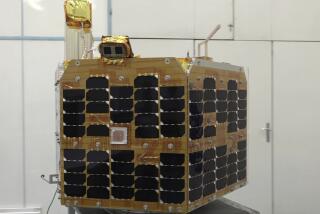Brazil Picks Up Pieces of Its Space Program
- Share via
SAO JOSE DOS CAMPOS, Brazil — The charred and twisted chunks of metal on the floor of a concrete warehouse are all that is left of Brazil’s first attempt to reach outer space.
Things began to go wrong about a minute after liftoff on a brilliant November day at the Alcantara Launching Center in the northeastern state of Maranhao.
One of the four booster engines malfunctioned, and the VLS rocket was veering off course. When it reached 11,000 feet, a technician at mission control hit a red button, and the $6.5-million rocket exploded over the Atlantic Ocean.
Also destroyed was a $5-million SCD-2A data collection satellite, which Brazil had hoped to place in orbit 465 miles above the Earth.
Even so, officials say it was a step forward for Brazil’s 36-year-old space program.
“There were some extraordinary achievements,” said Air Force Col. Hugo Pereira Chaves, director of Brazil’s Aeronautics and Space Institute. “For instance, the navigation control systems functioned perfectly during the one-minute flight.”
The institute, which built the rocket, is part of the Aerospace Technical Center, a sprawling research and development complex in Sao Jose dos Campos, 56 miles northeast of Sao Paulo.
Next door is the National Space Research Institute, which built the satellite.
Their mission is to put Brazil in the commercial satellite launching business, along with the United States, Russia, China, France, Japan, Israel, India and Ukraine.
Brazil is aiming at a slice of the growing market for small rockets capable of putting satellites of up to 770 pounds into orbits ranging from 155 to 620 miles out from the Earth.
“There aren’t many countries making satellite launchers this size,” said Luiz Gylvan Meira Filho, president of the civilian-run Brazilian Space Agency, which oversees the entire space program.
“In the not too distant future, we hope to carve out a market niche in this area,” he said, adding that Brazil’s main competitors are Israel, China and India.
Another option, he said, would be to lease the Alcantara launching facility to a foreign space program or to build rockets for other countries that want to place their own satellites in orbit.
The Alcantara complex is just south of the equator, not far from France’s rocket launching site at Kourou in French Guiana.
The Brazilian rocket that exploded Nov. 2 was the first of four prototypes. The second is scheduled for launch late in 1998 and is to carry another data collection satellite.
Meanwhile, technicians are busy assembling a new SCD-2 satellite for a planned May launch on a U.S-made Pegasus rocket. It is to join Brazil’s SCD-1 satellite, which was launched in early 1993 to collect data on agriculture and other aspects of the environment.
Although Brazil has the technological know-how to run most of its space program alone, money is a problem. The Space Agency’s annual budget to build rockets and satellites and maintain the Alcantara Launching Center is just 140 million reals, about $127 million.
To defray costs, Brazil has signed cooperation agreements with the United States, Russia, China, Argentina, France, Germany and Ukraine.
In mid-1998, a Sino-Brazilian Earth observation satellite weighing 1.5 tons is scheduled to be carried aloft by a Chinese rocket, Meira Filho, the space agency president, said. China will build 70% of the satellite and Brazil will do the rest.
During a visit by President Clinton in October, the National Aeronautics and Space Administration and the Brazilian Space Agency signed an agreement including Brazil in the International Space Station.
Many of the agreements were possible only because Brazil signed the Missile Technology Control Regime in 1995, agreeing to use its rocket technology only for peaceful purposes.
“It gave us access to technology which was previously unavailable to us,” Meira Filho said.
He shrugged off Brazil’s failed first effort to put a satellite in orbit with a home-grown rocket, calling it “a minor setback that in no way will divert us from our objective.”
More to Read
Sign up for Essential California
The most important California stories and recommendations in your inbox every morning.
You may occasionally receive promotional content from the Los Angeles Times.












